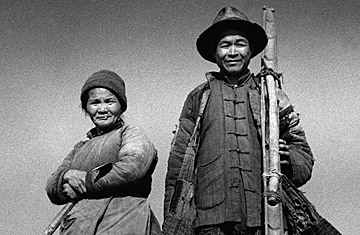
1945: Peasant farmers in Kunming, China
How ageless are China's problems and how bitterly Chinese history repeats itself in cycles of wars, floods and famines, TIME Correspondent Teddy White could tell last week from firsthand knowledge. He was just back from a two-week trip through starving Honan Province. His report:
My notes tell me that I am reporting only what I saw or verified; yet even to me it seems unreal: dogs eating human bodies by the roads, peasants seeking dead human flesh under the cover of darkness, endless deserted villages, beggars swarming at every city gate, babies abandoned to cry and die on every highway. Nothing can transmit the horror of the entire great famine in Honan Province, or the irony of the green spring wheat with a promise of a bumper crop which is not ripe for harvesting for two more months. Most terrible of all is the knowledge that the famine might have been averted.
Those Who Run Away. With Harrison Forman of the London Times I arrived in a town called Tunghsientien, a funnel through which refugees pour out of Honan. The refugees are stuffed into boxcars, flatcars, old coaches, layer upon layer deep. They are crowded on the roofs, children, old men & women clinging to any possible fingergrip as the trains hurtle along. Sometimes their fingers get so numb from the cold they fall off. The trains never halt.
In ten minutes we saw the first casualty—a peasant lying bleeding near the roadbed. He had fallen from a refugee train some hours before. The train wheels had cut his foot off. He was all alone, crying, and his flesh was mangled on the rail. The bones of his foot were sticking out like a thin white cornstalk. I broke open my medicine kit and gave Kim some sulfanilamide and we raced on to tell someone to send water and a doctor. But there was no doctor within a day's journey.
Nobody knows or cares how many refugees die on this road. They say two million people have moved out along this route since fall, by now probably 10,000 a day are drifting along westward. Of Honan's 34 millions we estimated that there have been three million refugees. In addition, five million will have died by the time the new harvest is gathered.
Those Who Stay and Beg. In Loyang we went to call on Bishop Thomas Megan of Eldora, Iowa, a greathearted Irish padre. When we came out of his relief dispensary, which is supported by American funds, the refugees tried to mob us. Men fell on their knees, surrounded us, folding hands in supplication.
The next day we went east, riding in an Army truck accompanied by Father Megan. Trees on the road had been peeled of their bark. Peasants dry and powder the elm bark and then cook it. They also eat leaves, straw roots, cottonseed and water reed.
The Army gave us horses to ride on farther east. In the cold first hour after dawn we passed the first corpse—a woman dead on the road. She must have been there at least overnight.
